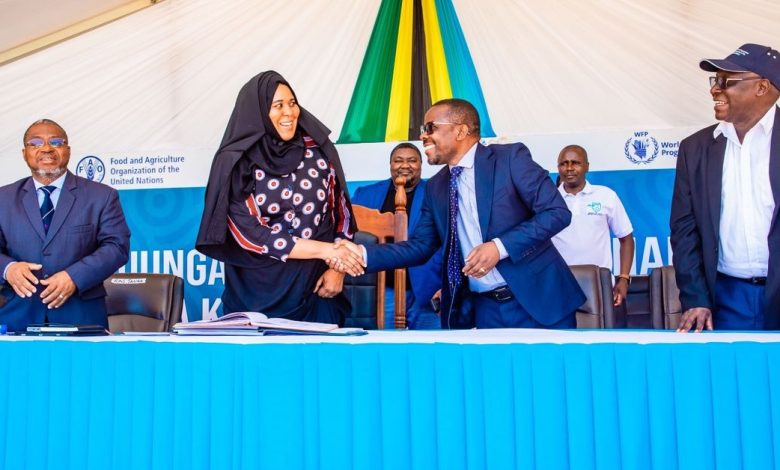Tanga calls for peace, food sustainability

TANGA: TANGA Regional Commissioner, Dr Batilda Burian, has said that peace is important in ensuring food security, warning that without peace, efforts to achieve food sufficiency and sustainability would be futile.
Speaking at the launch of the 44th World Food Day celebrations held at Usagara Secondary School grounds in Tanga City over the weekend, Dr Burian said Tanzania’s remarkable progress in food security and agricultural transformation has been possible because of the prevailing peace under the leadership of President Samia Suluhu Hassan.
“Do not be misled into actions that could derail the existing peace we have built over the years. Without peace and tranquility, we cannot achieve food security or meet the objectives of the 2030 Agenda to transform agriculture into business,” she said.
The event, held under the global theme “Join Hands for Better Nutrition for a Better Future,” brought together farmers, agricultural experts and development partners to reflect on the state of food systems and nutrition in Tanzania. Dr Burian said peace has enabled Tanzania to implement major reforms in agriculture, livestock and fisheries reforms that have strengthened food systems and improved livelihoods for millions.
In Tanga Region alone, over 102,000 hectares of food crops were cultivated in the 2024/2025 season, producing more than 1.8 million tonnes of food, nearly triple the regional consumption requirement of 621,000 tonnes, creating a significant surplus.
She added that the region has diversified its food sources through investments in livestock and fisheries.
Tanga currently has over one million cattle, producing more than 53 million litres of milk and 54,000 tonnes of meat annually, while fisheries and aquaculture contribute products worth 52bn/- each year.
“Food security is not just about producing enough to eat; it’s about sustaining systems that ensure continuous access to nutritious food and that cannot happen in an environment of conflict or instability,” she said.
Dr Burian also highlighted how peace has facilitated investments in infrastructure that support agricultural productivity including irrigation schemes worth 20.4bn/-, improved rural roads and input subsidies benefiting more than 13,000 farmers during the 2024/25 season.
She commended ongoing efforts to combat malnutrition, noting that the stunting rate among children under five in Tanga has declined from 34 per cent in 2018 to 24.1 per cent in 2022, while the proportion of underweight children fell from 15.6 to 11.2 per cent over the same period.
However, she expressed concern over the rise in child wasting from 2.7 to 5.6 percent, calling for renewed community awareness and inter-sectoral collaboration to improve nutrition outcomes. “Nutrition is a shared responsibility. Every family, institution and stakeholder must join hands to promote the production and consumption of balanced diets,” she urged.
Dr Burian further called on farmers and livestock keepers to embrace climate-smart and environmentally friendly practices, noting that climate change remains a growing threat to food systems.
“To sustain our progress, we must protect our environment and strengthen peace. A stable and peaceful Tanzania is the guarantee of our food security and our future,” she concluded.
Earlier, the Deputy Permanent Secretary in the Ministry of Agriculture, Dr Steven Nindi said the ministry is undergoing a major transformation to make agriculture a fully commercial enterprise.
“We aim to maintain food self-sufficiency but also to sell our produce to our neighbours, across the African continent and beyond,” he said. He noted that under President Samia’s leadership, Tanzania’s agricultural budget has surged from 294bn/- in 2021 to 1.3tri/-, enabling massive investment in inputs, irrigation and technology.
Since the 2021/22 season, the ministry has distributed agricultural inputs that helped raise food crop production from 18.6 to 22 million tonnes, while national food security has improved from 114 to 128 per cent, with surplus output rising from 2 to 5 million tonnes.
“Our goal is to expand national storage capacity to 3 million tonnes and increase production by 10 per cent by 2030,” Dr Nindi said.
On her part, Food and Agriculture Organisation (FAO) Country Representative, Stella Kimambo, said the day also marked the 80th anniversary of FAO celebrating eight decades of global cooperation to end hunger.
“Eighty years may mean old age for a person, but for FAO it signifies renewed strength and commitment to continue partnering with Tanzania to increase food production,” she said.
Ms Kimambo said this year’s theme emphasises global collaboration across all sectors to build sustainable and inclusive food systems, urging governments, organisations and communities to work together to achieve food self-sufficiency and nutritional well-being.
The celebrations featured exhibitions showcasing local food products, value addition innovations and traditional cuisines that reflect Tanzania’s rich agricultural diversity. The Prime Minister, Kassim Majaliwa would officiate at the climax of World Food Day celebrations on October 16.






I love playing online games in my spare time. Because it offers entertainment as well as an opportunity to earn real money. Moreover, the money is real and withdrawable so you can withdraw your winnings to any wallet. Download the app now.yalla rummy apk game